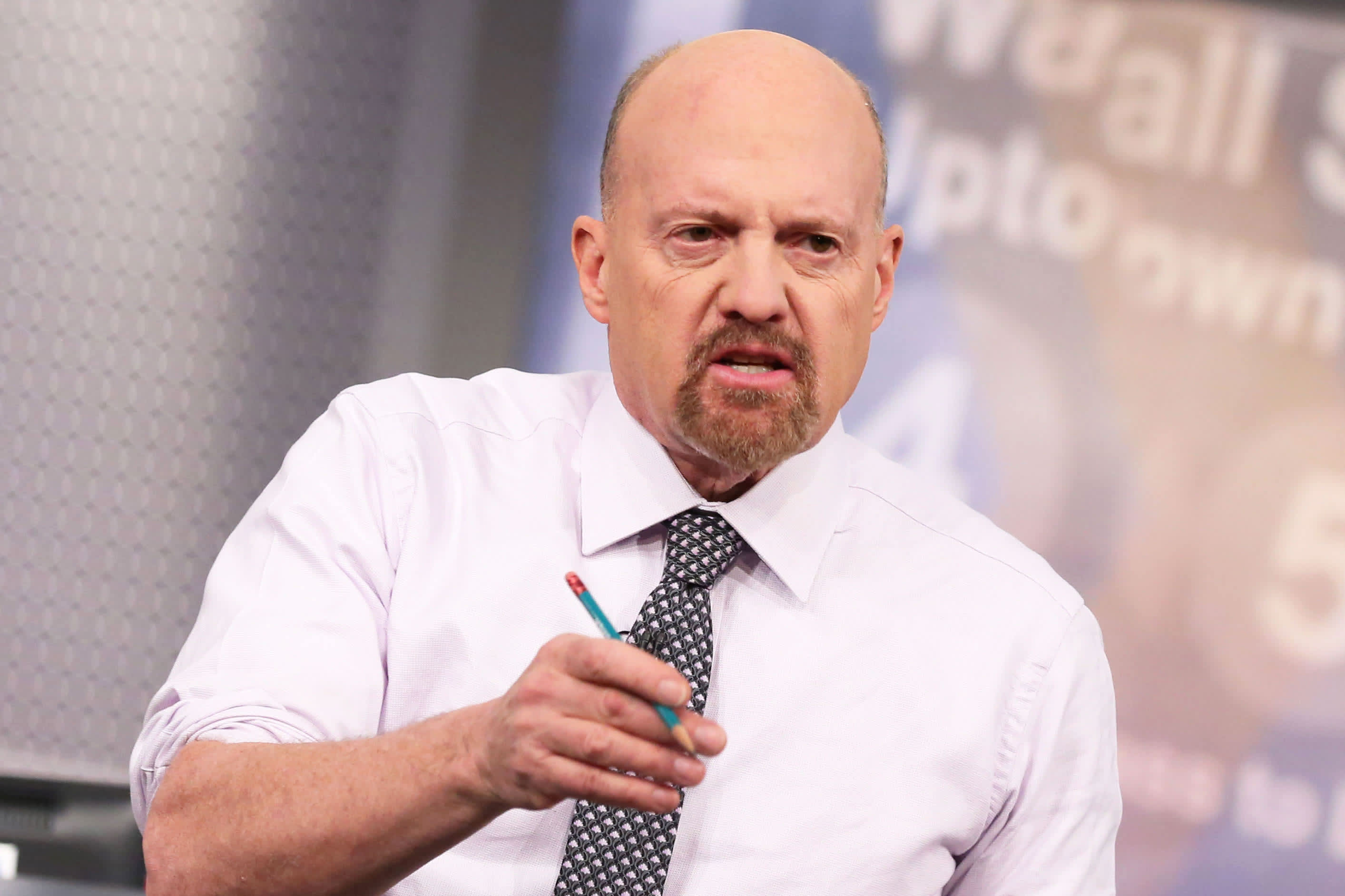
John Draper pours glyphosate into the tank of his sprayer at the University of Maryland's Wye Research and Education Center. Dan Charles/NPR hide caption
John Draper and I are sitting in the cab of a tractor on the research farm he manages for the University of Maryland, alongside the Chesapeake Bay. Behind us, there's a sprayer.
"So, away we go!" Draper says. He pushes a button, and we start to move. A fine mist emerges from nozzles on the arms of the sprayer.
We're spraying glyphosate, killing off this field's soil-building "cover crop" of rye before planting soybeans.
Farmers have been using this chemical, often under the trade name Roundup, for about four decades now.
But now it's under fierce attack, accused of causing cancer. In three civil cases so far, U.S. juries have ordered Roundup's inventor, Monsanto, now owned by Bayer, to pay enormous damages to cancer survivors. Thousands more lawsuits have been filed.
For this chemical, and for Monsanto, it's a stunning change in fortunes.
Farmers felt that they could spray glyphosate with a clear conscience. It doesn't persist in the environment as much as, say, DDT did. It doesn't build up in groundwater like another widely used herbicide, atrazine. And it's certainly less toxic than some alternatives.
"If we were spraying Gramoxone [the trade name for paraquat, another herbicide], even for you to be standing next to the sprayer, you'd have to have a respirator on. I'd have to wear a respirator even in the tractor, spraying," says Draper.
Monsanto started selling Roundup in 1974. For 20 years, it didn't attract much attention. That was Act 1 of the glyphosate drama: the quiet years.
Act 2 began in the late 1990s.
In 1996, Monsanto started selling genetically modified crops, or GMOs. They were modified so they could tolerate glyphosate. This meant that farmers could now spray this chemical right over their "Roundup Ready" soybeans, corn and cotton, and the crops would be fine but the weeds would all die.
It was a farming revolution built on glyphosate. Monsanto quickly became the world's biggest seed company. And farmers started spraying a lot more Roundup. Sales of the chemical increased more than ten-fold.
It all happened so fast that it scared a lot of people. There were anti-GMO protests around the world, and glyphosate came under increasing scrutiny.

A pedestrian walks past anti-glyphosate art in Popayán, Colombia. Glyphosate has been deployed in Colombia to wipe out coca and poppy crops. Dan Charles/NPR hide caption
The International Agency for Research on Cancer, part of the World Health Organization, decided to carry out a new assessment of glyphosate's risks.
On March 20, 2015, IARC announced its conclusion: Glyphosate is "probably carcinogenic to humans."
That conclusion rests on three kinds of studies. First, IARC found "strong evidence" that glyphosate can damage DNA in cells. This kind of damage, inducing mutations, is the first step in causing cancer. Second, there are studies showing that when mice ate glyphosate, they got more tumors. Kate Guyton, a senior toxicologist at IARC, told reporters at a news conference that "these two studies gave sufficient evidence of cancer in animals."
Finally, IARC says there's "limited evidence" that people exposed to glyphosate had higher rates of a particular kind of cancer — non-Hodgkin lymphoma.
Guyton has been studying the causes of cancer for decades. Nothing she has ever done, she says, provoked as much of a reaction as the glyphosate announcement. "The Internet kind of exploded," she says.
Anti-GMO groups felt vindicated. Monsanto's top executives were furious and launched a public relations campaign attacking IARC and its report.
And in the small town of Orange, Va., a personal injury lawyer named Michael Miller started lining up clients — people with non-Hodgkin lymphoma who'd used Roundup. "I decided that these people needed a voice in the courtroom," he says.
The scientific picture got more complicated, though. Other government agencies, including the U.S. Environmental Protection Agency and the European Food Safety Authority, took a fresh look at glyphosate. And they concluded that it probably is not giving people cancer.
David Eastmond, a toxicologist from the University of California, Riverside, helped conduct one of these glyphosate reviews for another part of the World Health Organization, the Joint FAO/WHO Meeting on Pesticide Residues.
"From my reading of things, if glyphosate causes cancer, it's a pretty weak carcinogen, which means that you're going to need pretty high doses in order to cause it," he says.
Eastmond says that there are several reasons for this apparent disagreement between IARC and the other agencies.
First, IARC just looks at whether glyphosate can cause cancer; regulators, on the other hand, have to decide whether it actually will, considering how much of it people are exposed to.
Second — and most important, according to Eastmond — different agencies considered different evidence. Eastmond's committee and regulatory agencies like the EPA considered a large number of studies that aren't publicly available because Monsanto paid for them and submitted them to the agencies. "I have never seen a chemical with as many animal cancer studies as glyphosate," Eastmond says.
IARC, however, didn't look at most of this research because it accepts only studies that are publicly available. This allows any other scientist to see exactly what IARC's conclusions are based on.
Eastmond, for his part, thinks company-financed studies are credible and valuable, despite the potential conflict of interest for companies carrying out those studies. The labs, he says, have to follow strict guidelines.
Finally, scientists sometimes look at the same data and disagree about what it means. Eastmond says that he and Guyton had "animated discussions" about some of the data. "We just evaluated the evidence differently, but, you know, these are honest disagreements [among] people who I think are well-meaning," Eastmond says.
Then Act 3 arrived. Glyphosate went to court. There were three civil trials in or near San Francisco.
Lawyers for Bayer, which now owns Monsanto, repeatedly reminded jurors that regulatory agencies had concluded that glyphosate is not a cancer risk.
Lawyers for the cancer victims, though, suggested that those same regulators couldn't be trusted because they'd been manipulated or fooled by Monsanto.
Miller and his legal team showed the juries a whole collection of internal Monsanto emails. In one, company executives described phone calls with an official at the EPA. As Miller describes it, the official said, "I don't need to see any more studies. I'm going to declare Roundup safe, and I'm going to stop another agency from looking at it."
Another Monsanto executive discussed ghostwriting papers on glyphosate's safety that scientists could publish under their own names.
"I think the jury was rightfully offended," Miller says.
All three trials ended with resounding verdicts in favor of the cancer victims. The juries ordered Bayer to pay huge punitive damages. In the most recent case, the damages totaled $2 billion.
Bayer is appealing these verdicts — and the damages probably will be reduced. But more lawsuits are waiting. The total value of Bayer's stock has fallen $40 billion since the first verdict was announced.
Alexandra Lahav, a professor at the University of Connecticut School of Law, says that one lesson of this case so far is that attempts to get favorable decisions from regulators can backfire in court.
"They then open themselves up for the jury to say, 'Wait a minute — you're trying to convince the regulator not to regulate you, and now you want me to believe that the regulator is completely objective,' " Lahav says.
When regulators are seen as weak or ineffectual watchdogs, she says, their seal of approval also carries less weight with the public — and with juries.
The next glyphosate trial is set for August in St. Louis.
https://www.npr.org/sections/thesalt/2019/05/30/727914874/safe-or-scary-the-shifting-reputation-of-glyphosate-aka-roundup
2019-05-30 09:00:00Z
52780305965488




:no_upscale()/cdn.vox-cdn.com/uploads/chorus_asset/file/16305723/Screen_Shot_2019_05_29_at_9.12.35_AM.png)
:no_upscale()/cdn.vox-cdn.com/uploads/chorus_asset/file/16305769/Screen_Shot_2019_05_29_at_9.06.07_AM.png)






